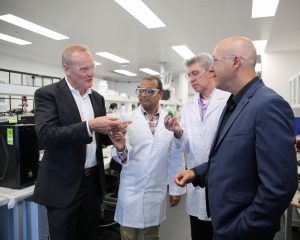The research program looks to progress technologies in recycling, bio plastics and carbon capture to address the plastic packaging challenges that faces the food and beverage industry.
The progressive collaboration, backed by FP Paradigm and Future Food System, utilises the UNSW Chemical Engineering department to address the challenges associated with post-consumer plastic waste and re-use of PET packaging. The partnership also includes support from Tacca Plastics and Pablo & Rusty’s Coffee.
“Working with Paco Industries and UNSW reflects our commitment as a business to go beyond our sustainability commitments and find innovative solutions so that The Arnott’s Group can continue to create delicious moments, not just for our consumers, but for our value chain”, says The Arnott’s Group Chief Transformation Officer Simon Lowden.
Aligned with the principles of the circular economy, the partnership bolsters The Group’s commitment to having 100% of its packaging made from materials that are capable of being recycled, having already achieved 98% (by weight) / 85% (by SKU) of packaging used by its Australian operations now being reusable, recyclable or compostable. The Group has also already transitioned 86% of its Australian biscuit packaging from multi-material to highly recyclable mono-material.
Paco is currently developing an innovative approach focusing on organic solvent technology for recycling. Paco’s technology is based on using organic solvents that can isolate PET (Polyethylene terephthalate) and has the potential to turn contaminated post-consumer PET waste back into food-grade PET for the food and beverage industry. The solvent can break down the plastic into its primary chemical chain and be purified into a high-purity ‘virgin-like’ material, creating an ongoing recycling solution.
PET is one of the world’s most commonly used plastic with 10.2% of all plastics being made from PET and roughly a third of all PET packaging is used for packaging for food and drink around the world1. The primary challenge for local recycling companies and municipal councils is the level of contamination on plastic making it harder to recycle without being thoroughly cleaned. Paco’s innovative solvent technology is designed to eliminate contaminants such as organic material stuck to plastic food trays, soft drink bottles or other materials and contributes to the circular economy by reducing the need for virgin material production.
Paco Head of Commercial Steven Commerford says, “The results of this project to date are incredibly exciting for both sustainable and commercial gains.
“We’re focused on creating real solutions that don’t come with caveats. We’re crafting solutions that are genuinely transformative, without the usual limitations of high costs, energy, and water usage, or short-term viability. This technology could revolutionise our approach to recycling and redefine the materials we consider recyclable,” he said.
Through this partnership, The Arnott’s Group is supporting a future where environmental stewardship and technological innovation converge.




